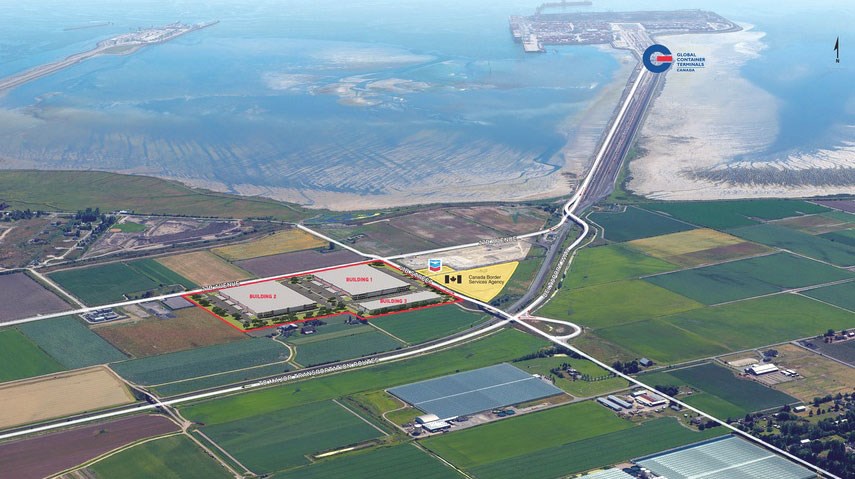The Tsawwassen First Nation has emerged as the gatekeeper for scarce industrial land in the Fraser Valley. but speculators are taking its inventory up fast.
A new CBRE Vancouver report noted that Metro Vancouver, at a record low of 2.7 per cent, now has North America’s lowest industrial real estate availability rate. This puts the region on course to run out of industrial land 10 years earlier than previously projected, CBRE estimates.
That would be within three years, based on a 2015 Metro Vancouver forecast that the inventory of vacant industrial land could be “substantially” absorbed by 2030 due to average annual take-up of more than 900 acres.
The Fraser Valley is the industrial breadbasket for the region, but its inventory is disappearing at a rapid pace. Surrey has an estimated 1,600 acres of vacant industrial land, but much of it is covered by non-industrial use, such as residential, commercial or agriculture.
In some cases, land is not suitable for industrial use due to terrain or access challenges.
The eastern Fraser Valley was once the industrial backstop for Metro Vancouver, but industry surveys show that there is just 212 acres readily available in Abbotsford and only 150 acres of industrial land shovel ready in Chilliwack.
The Tsawwassen First Nation (TFN) holds 300 acres of flat industrial acres in a prime South Delta location, but it is leasing it out quickly.
This June the TFN announced the first phase of its three-phase Delta iPort container logistics centre will be built on a 57-acre portion of industrial development site adjacent to the Port of Vancouver’s Deltaport.
The $130 million development spearheaded by TFN Economic Development Corp., the band’s land development arm.
Lead developer on the project is GWL Realty Advisors Inc., which is developing Delta iPort as a speculative venture on behalf of Healthcare of Ontario Pension Plan (HOOPP).
The institutional investor is not normally given to involvement in speculative ventures. But the long-term prospects for Delta iPort and transpacific containerized cargo convinced HOOPP to step outside its comfort zone, said Geoff Heu, GWL’s vice-president of development, Western Canada.
“We are confident that there are enough large-scale tenants looking for a product like this … that it will get leased up very quickly, so we’re not going to wait for a pre-lease tenant,” Heu said.
The TFN’s site is near the South Fraser Perimeter Road, just over 10 miles from Vancouver International Airport and close to the Canada-U.S. border.
Because it’s on First Nations land, Delta iPort is subject to a long-term lease. Once the pre-paid 60-year lease expires, Delta iPort will revert to the band.
Delta iPort’s 453,000-square-foot first phase is to complete by May 2018. A similar-sized second phase and a slightly smaller third phase will follow. The entire project is scheduled to be finished by 2020.
Delta iPort will accommodate nearly the entire 230 acres of industrial development planned for TFN land.
When that is gone, what is left?
“A lot of groups have always said there’s a ton of land out in Abbotsford, Chilliwack, and that’s the release valve on our industrial land supply, but unfortunately that’s not the case,” said Garth White, a principal with Avison Young in Vancouver who specializes in Fraser Valley industrial sales and leasing.
Molson Coors recently broke ground on its new brewery in Chilliwack. The 36-acre parcel next to Highway 1 was eligible thanks to special zoning allowing food and beverage processing within the Agricultural Land Reserve.
“That was one way we were able to get additional industrial land out a number of years ago,” explained Brian Coombes, president of Chilliwack Economic Partners Corp. “[But] you can’t just put anybody there.”
“We’re fortunate to not be at a stage where we’re out of land, but definitely inventory is shrinking, just like everywhere, and that’s driving prices up,” Coombes said, underscoring the challenge facing Chilliwack as well as Abbotsford.
In 2004, Abbotsford identified the need for 1,300 acres of industrial land to accommodate future demand. It still doesn’t have it.
Abbotsford asked the Agricultural Land Commission for 925 acres, but received just 445 acres. Today the city has come full circle, Mayor Henry Braun said.
“At the absorption rate we’ve had, we’re going to be out of serviced industrial land in about four to five years,” he said.



